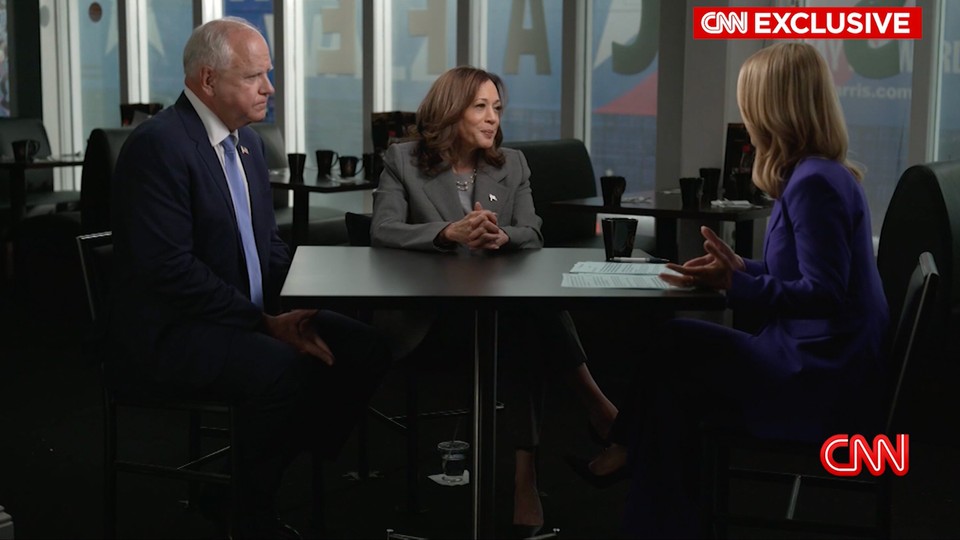Harris and Walz Ease Into Prime Time
4 min read
Kamala Harris and Tim Walz have now completed their CNN interview. On social media and cable TV, the responses have broken down pretty much as one might expect. Democrats think it was a home run. Republicans are sour and churlish. The truth is that the interview was a solid and competent outing, which is all it needed to be.
Harris, who is sometimes prone to wordy circumlocutions, looked assured and handled reasonably well some of the stickier questions, such as why she changed her position on fracking. She had a strong answer when she was asked how she’d thought about her future when Joe Biden called her: Her first thought was about the president, not about herself, which is exactly the right thing to say, no matter what thoughts may have gone through her head at that moment.
She was less convincing when she was asked whether she still thinks illegal border crossings should be decriminalized (a position she took when running for president in 2019). On CNN, she said she would enforce American laws at the border. Well, yes, “enforcing the laws” is what presidents take an oath to do. “I recognize the problem,” she added, which is another way of saying that things she said in a Democratic primary four years ago are not useful for running in a general election in 2024.
Her weakest answer was also about Biden. When asked if she regretted assuring Americans that Biden was up to the job for four more years, she defaulted to saying nice things about Biden and being proud of the administration’s record. A simpler answer was hanging right there: Joe Biden believes that I have a better chance of beating Donald Trump; it was his decision to make, and if he had decided to stay in the race, I’d still be supporting him. The End.
Walz, meanwhile, said very little, which undermined predictions from some on the right that he was there to tackle Harris if she started pulling sticks out of some shaky verbal Jenga pile. Instead, he quietly deflected questions about his military service and his family’s fertility issues; although Republicans won’t like his answers, he was smart not to start parsing whether he served in wartime and the differences between in vitro fertilization and intrauterine insemination. Instead, he said he would never deprecate anyone’s military service and deplored the way the GOP wants to limit options for women.
In effect, Harris did what presidential candidates are supposed to do: After running as a liberal in California and in the 2020 primary, she is tacking to the center. Such a plain, common-sense strategy might seem unusual in our enervated political environment, and some of the answers will annoy political observers for being light on substance. But avoiding these policy snares remains a wise choice: Harris and Walz are running against Trump, who cares nothing about policy and will change his position in a heartbeat if he thinks it’s to his advantage. (Note his recent comments on abortion that his team is already trying to walk back, and his new stance in the past 24 hours about public funding for IVF.)
At one point, when asked about Trump’s racist charge that Harris somehow “happened to turn Black” some years ago, Harris said: “Same old, tired playbook. Next question.” This dismissiveness is likely to annoy Trump, who counts on his opponents to take the bait and then get all tangled up trying to point out how awful Trump is while still trying to appear reasonable. The Harris-Walz strategy seems to be to brush off Trump’s worst attacks, and instead to offer reassurance that they are normal human beings with some ideas about how to govern the country.
Trump is unlikely to sit for this kind of grilling before November, not least because he cannot hold a coherent thought for more than a few moments. So all Harris had to do was draw comparisons based on broad policy directions and obvious character distinctions. Republicans hoping that Harris would get lost in her own rhetoric or commit some stunning gaffe, or that Walz would interrupt her or seemingly overrule her, will be disappointed. None of that happened, and so the GOP will of course complain that there wasn’t enough detail to criticize.
Scott Jennings—the new holder of the Jeffrey Lord Chair of Republican Sycophancy at CNN—seemed annoyed, for example, that Harris wouldn’t show “remorse” over policies enacted by Biden. This is a strange objection: Sitting vice presidents looking to succeed their bosses do not usually express deep regret about their own administration’s policies. Republicans might worry more that Harris and Walz were given this opportunity to respond to points that will almost certainly be thrown at them in the upcoming debates. The Democratic team got to field-test some answers to the most obvious lines of attack.
This encounter was not a watershed event. Nothing much changed, no new positions were revealed, and no one committed any major errors. If Trump’s team was hoping for something here to change the momentum of the race, this wasn’t it. So now they must look ahead to the debates. But if the calm assurance of the Democratic candidates is a preview of how Harris and Walz will approach those, the Republicans—and especially Trump, who has been in a multi-week public meltdown—should be concerned.



